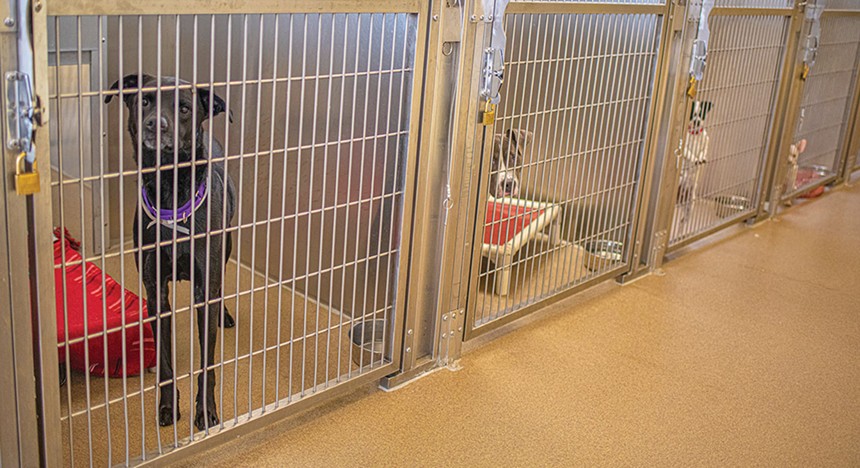Another dog, Julian, was becoming a “frequent guest” at the shelter. After two failed adoptions — both families returned the dog “due to his rambunctious energy” — it was clear that he needed a home where he could get lots of exercise and attention.
And London, who was on the shy side, was what the shelter staff referred to as a “door darter.” After her first adoption in May, she escaped the house, was hit by a car, and had a hind leg amputated as a result. London’s second adoption went better, but not by much: She was returned once more to the Aurora shelter because of issues with the adoptive family’s cat.
In 2022, Denver area shelters and rescues have seen a significant increase in the number of animals that need assistance. While volunteers and a regional network of shelters are working to meet those needs, finding the right help — and the right home — for pets like Peggy Sue, Julian and London has become a major challenge, largely because of recent economic shifts. And shelters are feeling the strain.
While animal shelters mostly emptied out during the 2020 coronavirus pandemic lockdown, today they are struggling to accommodate all of the animals that require help.
“Dogs get great care at the shelter, but it’s not the same as they’ll get in a home,” explains Emily Williams, communications director for Denver’s Department of Public Health and Environment, which operates the Denver Animal Shelter. “If they’re in the kennel day in and day out for several months, it’s not healthy for the dog — and it makes it harder to adopt them out.”
Despite popular myth suggesting that a plethora of people adopted animals during the pandemic, shelter and rescue staffers say that the low numbers in 2020 can’t be attributed to a surplus of adoptions.
“Pre-pandemic, it was pretty much business as usual, and then we did notice a significant drop of our intakes of any type in 2020 and 2021,” says Nicole Robbins, community outreach coordinator for the City of Aurora Animal Services.
“Contrary to what people think and have heard, adoption rates did not go through the roof,” adds Meghan Dillmore, the shelter service manager for Denver Animal Shelter. “Fewer people were surrendering their pets, and there were fewer strays. So that, more than anything, was the reason for our lower population during 2020.”
Katie Parker, the vice president of operations at the Denver Dumb Friends League, agrees, calling 2020 a “false flag” of a banner year for shelters. “It was just a result of being shut down," she says. "It wasn’t like animal sheltering was resolved; it was just low activity.”
There's plenty of activity at shelters today, though.
Facilities throughout the metro area are reporting a jump in the number of animal intakes, particularly owner surrenders, which are largely attributed to the increased cost of living. And despite managing larger-than-ever numbers of animals, in many cases shelters are doing so with fewer resources.
“Just like there’s been a disruption to the workforce, there’s been a disruption to the volunteer force and how people are able to donate unpaid time,” Parker says. “People can’t be as committed to a schedule or to getting here regularly, or they sign up for a volunteer shift and are unable to follow through.”
As a result, shelters can’t rely on volunteers to supplement some of the needed work, and if the shelter staff can't step in, animals go without quality one-on-one time, walks and other needed human interaction.
Inflation has affected donations; remote work and job shifts have impacted volunteers’ ability to show up when needed; and some shelters have been trying desperately to fill open positions for both veterinarians and vet techs, with little success. While they are still committed to providing every animal with appropriate behavioral and medical care before adoption, some of those animals now have to wait for much longer than the ideal — weeks or even months — to get the treatment that they need.
And COVID has definitely had an effect, even if it wasn't a major bump in adoptions early in the pandemic. “Everything every team does affects every other team in the shelter,” explains Dillmore. “Since the beginning of COVID, we have seen a 50 percent increase in cruelty-and-neglect cases, and because those animals are considered both property and evidence, we have to hold them through the outcome of the court case.”
Court cases that stretch longer and longer have a ripple effect on the shelter managing any animals involved. “Our length of stay has greatly increased,” Dillmore says, “and that’s not just because of these cruelty-and-neglect cases; it’s also because we’re not seeing as many adoptions as we normally do.”“Since the beginning of COVID, we have seen a 50 percent increase in cruelty-and-neglect cases."
tweet this
According to Parker, shelters across the state are stretching their resources, and that often results in delays in treatment for all animals. The Dumb Friends League shelter in Alamosa has been seeking a vet for almost a year. “So what we have to do is send vet teams from Denver to support our shelter there periodically, which then slows our work here a little bit," she says.
Other organizations have had to adjust operating hours to reflect the low-staff realities; Robbins notes that this summer, the Aurora shelter had to close for another full weekday: Tuesdays as well as Sundays, until further notice. “One of our key staff members went on maternity leave, and that was like losing an arm,” she remembers.
One possible solution to this shortage — a bill that Parker says would create a mid-level veterinary practitioner in Colorado “who could supplement the work that vets don’t have time to do and that vet techs can’t do" — was proposed as part of the Colorado Veterinary Practice Act bill introduced during the last legislative session, but it didn't pass.
She has high hopes that this particular measure will pass the next time it's considered. And in the meantime, staff members continue to make do with the resources available.
“We aren't forced to turn animals away — animals still get the care they need — but they have to wait; they're in our care longer, and it's not ideal,” Parker explains. “Our goal is always to have the animal at its final destination, its new home in the community, as quickly as possible.”
Owner surrenders are higher than usual this year, and the shelters' already thin resources are stretched to near invisibility. The Aurora Animal Shelter saw owner surrenders nearly double from 2019 to 2022. Foothills Animal Shelter has seen a 58 percent increase in owner surrenders in 2022 compared to 2019, and the year isn’t over yet. Joan Thielen, marketing and community engagement manager at Foothills, says that at this point in time, “we can’t attribute that to people returning the pandemic puppy.”
Instead, based on requests regarding other community programs, she suspects that cost of living and inflation are the biggest culprits in this unfortunate trend.
“We are seeing more pets come in with more needs, whether that’s behavioral or medical, and the family is not able to accommodate that,” Thielen says.
“There are so many economic variables that are affecting people’s ability to retain their pets, and housing is number one,” says Pam Krider, director of marketing and communications at the Denver Dumb Friends League.
“When we talk about the housing crisis and pets, it has so many different variables — whether it’s people having to move in together, having to downsize, going from a single-family home to an apartment or a conjoined-wall house, or someone going into public housing where there are no-pet policies,” notes Parker. “All of these things restrict the ability for the pet to stay with the family, and we are seeing those heartbreaking scenarios every day, where the only options to house the people do not also accommodate the pets they have.”
The Dumb Friends League, like other shelters, has tried to implement or boost programs that can provide food or vet services to families, in hopes that alleviating some of the costs of pet ownership can give those owners the breathing room they need to stay in their current residences and pay the increased rent or higher utility bills.
Foothills Animal Shelter has a set of programs that helps families facing challenges such as homelessness or domestic violence, called Better Together, which helps board pets free of charge for up to ten days.
“We’ve seen an increase in demand for that program, so much so that we’ve hired a social worker full-time to help manage it,” Thielen notes.
Shelters are not the only facilities feeling the crunch.
According to Kelly Money, founder and director of Rocky Mountain French Bulldog Rescue, the RMFBR saw forty surrendered dogs in 2019, 20 percent of which had special medical needs. In 2020, 22 dogs passed through the rescue. “So far in 2022, we are on track for 85, so we’ve doubled our numbers over 2019,” she says.
As a breed-specific rescue that handles special-needs dogs, RMFBR has found the challenges particularly acute, not just because of owner surrenders, but also not-so-obvious variables such as backyard breeding.
“We’re at 85 percent severe medical needs right now,” she explains. “French bulldogs can go paralyzed; it’s one of their many health issues. They are the second-most-popular breed in the country right now, and because they are so popular, people started doing a lot of backyard breeding” during and after the pandemic.
It might seem like a no-brainer to pay $1,500 for a backyard-bred French bulldog puppy when a registered pup from a legitimate breeder can cost upwards of $3,500. But the lack of oversight can quickly catch up to Frenchie owners: The dogs are prone to not just paralysis, but also allergies, eating problems (because of their facial alignment) and heart disease.
“With the backyard breeders and everyone going back to work, and all of these additional medical issues in the dogs, we’ve exploded,” Money says. The rescue had to suspend intakes during August owing to a lack of funds; they simply didn’t have the money to get appropriate veterinary care for the animals, and this group needs quite a bit of specialized health support.
“Each dog is running us about $5,500 in medical bills,” she continues. “We won’t adopt out a dog that we know has a medical problem unless there’s a plan in place for that medical problem.”
This policy means that dogs like Eva, who is prone to urinary tract infections, might be fostered through the rescue for weeks, if not months. “Every time I take Eva to the vet, she has another UTI,” Money says. “We just did an ultrasound on her, but we’re not going to adopt her out until we figure out why she has UTIs. While it’s up in the air, we’re just spending money.”
Because French bulldogs are such high-needs animals, Money notes, she is often asked to take one from a local shelter or from a rescue in another state.
“This last summer is the first time we had to stop intakes,” she says. “And it's not just Denver. It's Frenchie rescues in Washington, Chicago — everyone's had to take a break at some point this summer to catch back up.”
“We are a network, and a larger force than any one sheltering organization,” explains Alice Nightengale, Denver Animal Shelter’s interim director of animal protection. “The Denver metro area and Colorado, as well as more broadly, has a very connected, very supportive sheltering group. We couldn’t be as successful as we are without the ability to move animals between shelters, in spite of sharing some of our pain points.”
That shelter network has proved invaluable, in the past as well as today. “When Aurora had the pitbull ban, we could send them to other shelters and get them into homes,” remembers Robbins. “As a smaller shelter, we don’t always have the type of dog or animal that people might want, and we can send them to the bigger shelters,”
To help support those efforts, animal-care organizations rely heavily on volunteers, donations, fundraising events (the Denver Animal Shelter has a masquerade ball coming up on October 15 at the Governor’s Mansion) and the community itself.
“It can't just be up to a shelter to solve these problems and be creative and innovative,” Nightengale says. “We need the community to join us and participate, whether through fostering, volunteering or advocating with neighbors for great pet ownership and animal welfare.”
After all, shelter-driven efforts to keep pets with families and soften the sting of inflation can only stretch so far. Flexible housing policies that allow pets in more places would help alleviate the situation, Parker believes, as would an increase in the number of stable households that can adopt an adult pet. “If people want to have an adult dog or cat join the family, all the shelters can benefit from that,” she says.
At the Aurora shelter, Robbins notes, “our owner-surrender dogs always take the longest to get adopted, which is interesting, because the owner surrenders don’t have to wait in the stray hold. It still takes them about a week longer to get adopted.”
Foster homes are in high demand for all shelters and rescues, as are forever homes. “If you’re looking for a pet, please look at your local shelter first,” implores Dillmore, who points out that the Denver Animal Shelter has reptiles, birds, rabbits, guinea pigs, mice, hamsters, rats and other animal species beyond cats and dogs.
Rocky Mountain House Rabbit Rescue has some practice at finding foster homes on short notice. When the coronavirus pandemic hit in March 2020, it coincided with an outbreak of RHDV (rabbit hemorrhagic disease virus), which affects both wild and domestic rabbit populations and is highly contagious and usually fatal.
“We fostered out the majority of the rabbits in around March of 2020, because that way, if a pair of rabbits caught RHDV and died in somebody’s house, that’s two rabbits and not 120 rabbits,” recalls Paula Shafer, an RMHRR boardmember. Rabbits are highly social animals, and RMHRR always fosters and adopts rabbits in pairs if there aren’t any rabbits already in the home.
But RMHRR hit rocky times the next year, when there was a change in management, leaving the rescue without a facility. At that point, it decided to foster out its entire animal population to volunteers.
“We have a really detailed schedule of which rabbits are where and who took what supplies,” Shafer says. “We have a great foster network, and it’s all volunteer. Nobody has ever been paid other than mileage reimbursement. It is totally to the credit of all these people who love rabbits.”
Ultimately, the RMHRR board was able to purchase a new building for the rescue, a former egg production facility in Erie, which Shafer says is going to be “so awesome” when it opens officially (the grand opening is scheduled for October 16). It’s currently home to a handful of rabbits who couldn’t be accommodated in foster care, and the board hopes to get all of the rabbits who haven't been adopted back from their foster homes before the opening.
The challenges of the pandemic haven't disappeared. “Almost every day, I get a notification that there’s a rabbit running wild,” Shafer says, adding that some rabbit owners decide to release their pets outside instead of surrendering them to a rescue.
“These rabbits are like babes in the woods,” she notes. “They’ve never known how to fend for themselves, and they have terrible coloring for hiding. Tons of them just get eaten. The ones that don’t get eaten find each other, and then they breed — like rabbits do.
“We’ve been called out on many occasions to rescue ‘a couple’ of rabbits, and we wind up with thirty,” Shafer adds. “I have a person right this minute who is trying to get rid of a mother and father and nine babies who are two weeks old, and most of the shelters can’t take them with the babies because it’s going to be four months before they can spay and neuter them. Which means someone has to foster them for four months, and that is a huge drain on foster resources.”
Those foster resources are what kept RMHRR running through the past year. It's grown the group over the years through social media events like the annual “Bunny Bowl” (a Super Bowl Sunday livestream) and adoption drives. “People love bunnies, and they’re cute — they sort of sell themselves, kind of like Palisade peaches,” Shafer says, and laughs.
“I get these calls to rescue rabbits, and now it’s kind of a puzzle. We try to figure out how to fit them in somewhere — if we move this rabbit here, then can we fit this other rabbit in there?" she explains. “It’ll be much easier once we open the shelter."

The third adoption was a charm for Julian (right), pictured with his new family.
Aurora Animal Shelter
In Peggy Sue’s case, the Aurora Animal Shelter’s behavior team spent several weeks working with the dog to help her overcome her fear, build confidence and create meaningful relationships with shelter staff, and it didn’t take a significant stretch of time to find her forever home after she was eventually ready. Her adopted human says she is thriving in her new environment.
A third try at adoption proved a charm for three-legged London. And after they saw his story on Facebook, a couple whose last dog had similar high-energy needs took Julian home with them. According to shelter notes, the family "was exactly what Julian needed."
















